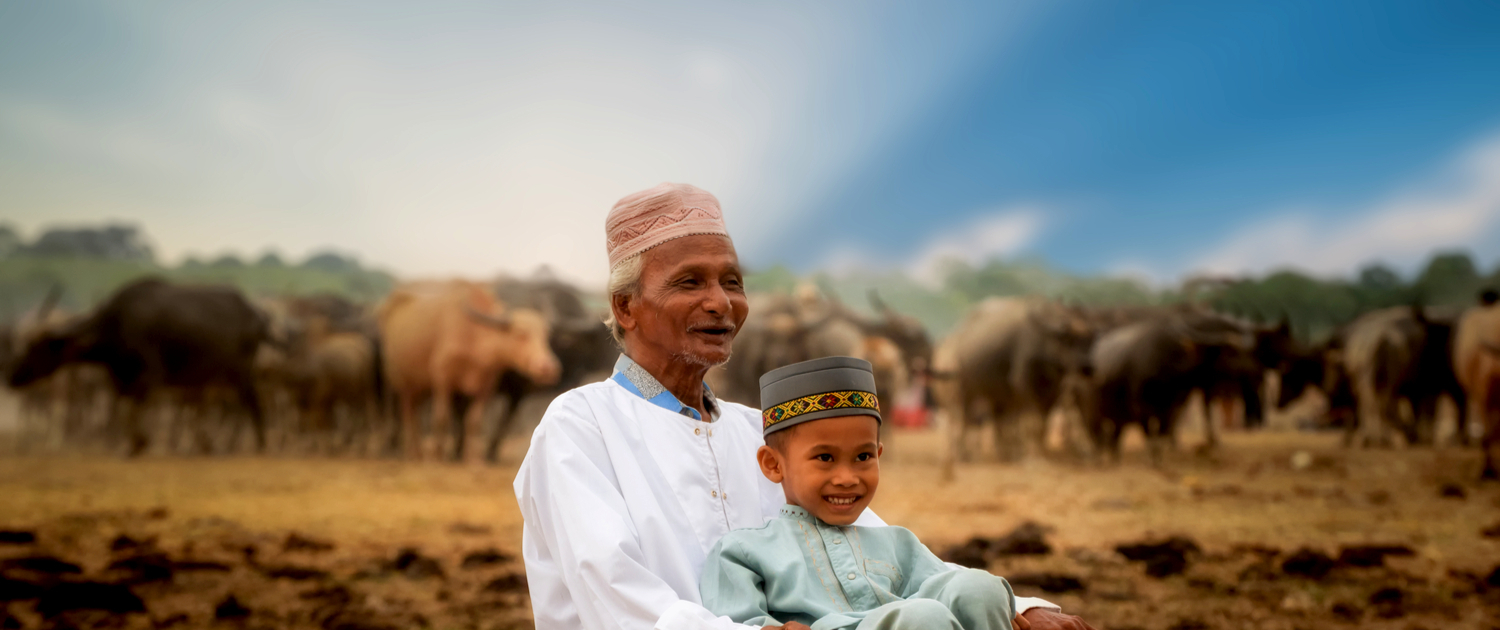The Prophet’s Smile: Responding to Rudeness With a Smile
The Prophet’s Smile Series Part Six: Responding to Rudeness With a Smile
By Shaykh Amin Buxton
In this series, we discuss the practices and acts that brought a smile to the Prophet Muhammad’s blessed face and made him laugh. We hope that by applying these lessons, we can gain his pleasure, and gain closeness to Allah Most High. In this article, we explore valuable lessons from an incident our beloved Prophet had with a bedouin.
Responding to Rudeness With a Smile
Anas narrates that he was once walking with Allah’s Messenger (peace and blessings be upon him), who was wearing a Najrani shawl with a rough edge. All of a sudden, a bedouin came up behind him, took hold of the shawl, and pulled it with great force. The Prophet turned to face the man and Anas noticed that the force of the pull had left a mark on the Prophet’s neck.
“Muhammad,” he said, “Give me some of Allah’s money which is in your possession!”
The Prophet looked at him, smiled and instructed that he be given something.
(Narrated by al-Bukhari and Muslim)
This short incident brings to the forefront a number of the Prophet’s astounding character traits.
He was walking with a servant, Sayyiduna Anas, who was a child at the time, shows his humility. Although he was the greatest human ever to walk the earth, he was glad to walk with anyone regardless of their age, gender, race and social standing. His choice of clothing is further evidence of his humility and lack of concern for worldly things. He could have worn the finest and smoothest of fabrics but he was happy with a shawl made in the Najran region of Yemen with an edge so rough – it was uncomfortable.
Further, we witness the immensity of the Prophet’s forbearance, a beautiful quality known in Arabic as hilm. We are told that the description of the Prophet in the Torah is that the more rudely he is treated, the more he increases in forbearance. The Bedouin came from behind and, without any warning, grabbed the Prophet’s shawl, pulling it so hard that it physically hurt him. To add to this, he addressed him in a rude and blunt fashion. We are told in the Quran not to address the Prophet as we address our peers and equals, but this man was obviously ignorant of this. With no regard for good manners and without explaining his situation, he demanded that he be given some charity or zakat.
We have to ask ourselves, how would we react in a similar situation? Our surprise and shock at being accosted from behind would quickly turn to anger and indignation. Then perhaps some pride and arrogance would creep in: how dare this person treat me like this! Who does he think he is? Does he really think he’ll be given anything after this?
This might well be our reaction. But it was not the reaction of Allah’s Beloved (peace and blessings be upon him). He had justification for becoming angry, but he did not. He could have turned away and ignored the man, and this would have taken great self-control, but rather he turned towards him. Instead of turning away from him, he turned towards him. The companions tell us that whenever someone called the Prophet from behind, he would turn his whole body to face them, give them his full attention and then respond.
The Prophet’s response to the rudeness of the man’s demand was a smile or even a chuckle, depending on how the hadith is translated. Ugliness was met with beauty. He then instructed that the man be given something.
The Prophet recognized the truth of the Bedouin’s statement – that indeed it was not his money, but rather Allah was the true giver and he was merely distributing what Allah had given. This is true humility – to accept words of truth from whoever utters them, even if they come in such a blunt form.
The Bedouin had most likely recently embraced Islam and the Prophet knew that he had to be treated with special care. In this, there is a valuable lesson for us in how we should treat anyone, particularly those who are new to the faith or new to practicing it. They may not be familiar with some of the manners and etiquettes that we have learned over time. They may have grown up and lived in difficult environments.
This was perhaps the only time that the Prophet and the Bedouin were to meet and had the Prophet rebuked him, it could have shaken the man’s faith.
Instead, his faith would have been made firm by the Prophet’s beautiful character and the receipt of financial support. This would have been his abiding memory of the Prophet. This is what he would have told his family, his children and his tribe about. The Prophet’s beautiful and warm smile would have lived with him for the rest of his days.
